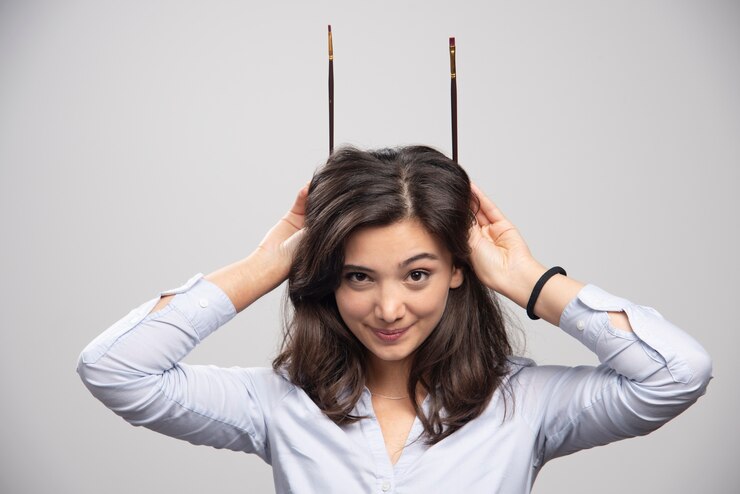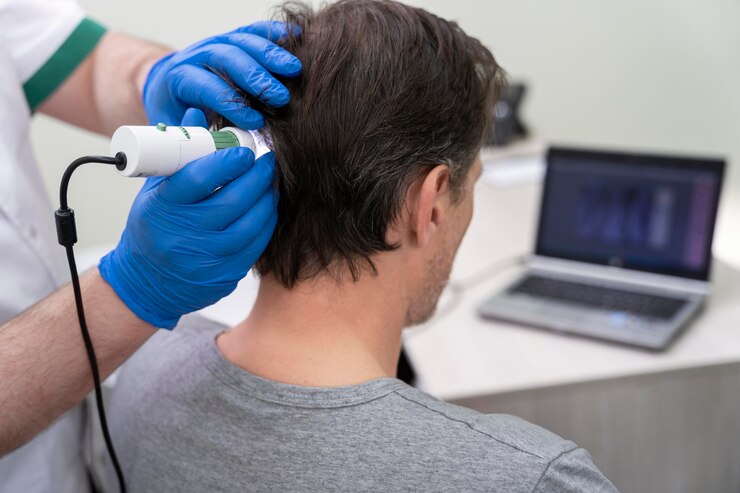
How Can I Stop Permanent Hair Loss? Exploring Effective Strategies and Treatments for Reversing Hair Loss
admin
- 0
- 19
To stop permanent hair loss, consult a healthcare professional and consider FDA-approved treatments like minoxidil or finasteride. Adopting a healthy diet and reducing stress can also be beneficial.
Hair loss can be distressing, affecting both men and women. Identifying the underlying cause of hair loss is crucial for effective treatment. Engaging with a healthcare provider can lead to a personalized plan that may include proven remedies, such as topical applications or oral medications.
Incorporating a balanced diet, rich in essential nutrients like proteins, vitamins, and minerals, supports hair health. Regular exercise and stress management techniques, like yoga or meditation, play a role in reducing hair fall. Maintaining a gentle hair care routine that avoids harsh chemicals and heat may prevent additional damage. Remember, early intervention is key, so taking action at the first signs of thinning can increase the chances of preserving your hair.

Table of Contents
ToggleExplaining The Causes
Tackling hair loss often feels like an uphill battle, but understanding the root causes is the crucial first step to addressing the issue effectively. Hair loss can stem from a variety of factors, and pinpointing the exact cause is key to finding the right treatment. In this section, we will explore three primary culprits: genetic factors, hormonal imbalance, and underlying medical conditions which all play a significant role in permanent hair loss.
Genetic Factors
Genetic predisposition is one of the leading factors in hair loss, particularly in a condition known as androgenetic alopecia, more commonly known as male or female pattern baldness. Your genetic makeup influences how sensitive your hair follicles are to dihydrotestosterone (DHT), a hormone derived from testosterone, which can lead to hair thinning and eventual loss.
Hormonal Imbalance
Hormones play a central role in regulating hair growth and health. Imbalances, particularly of androgens and estrogens, can lead to hair thinning. For women, significant life changes such as pregnancy, childbirth, or menopause can trigger hair loss due to shifting hormone levels.
Medical Conditions
A multitude of medical conditions can contribute to hair loss. Thyroid disorders, autoimmune diseases like alopecia areata, scalp infections such as ringworm, and other skin disorders can all affect hair growth. Moreover, certain medications used to treat cancer, arthritis, depression, heart problems, and high blood pressure have been known to cause hair loss as an unfortunate side effect.
To comprehensively address hair loss, one must initially recognize and understand these underlying causes. Once the cause is identified, a tailored approach to treatment can be implemented to combat permanent hair loss effectively.
Identifying Permanent Hair Loss
Grasping the nature of permanent hair loss is paramount for taking proactive measures. It is essential to detect the warning signs early and understand how they differ from temporary hair shedding. Let’s explore the facets of permanent hair loss to establish a solid understanding of what you might be dealing with.
Differentiating Temporary Vs Permanent Loss
Temporary hair loss is often reversible and can be attributed to factors such as stress, diet, or medications. Conversely, permanent hair loss, also known as androgenetic alopecia, can be hereditary and manifests itself in patterns that are more difficult to reverse. Recognizing the type of hair loss is crucial in seeking appropriate treatments. Here are some differentiators to consider:
- Cause: Temporary loss may be due to lifestyle changes, whereas permanent loss often has genetic roots.
- Pattern: Permanent loss usually follows a predictable pattern, such as a receding hairline or thinning at the crown, while temporary loss is more diffuse.
- Duration: If hair loss persists beyond six months, it may indicate a permanent condition.
Impact Of Scalp Health
A healthy scalp is the bedrock of robust hair growth. Inflammation, scalp disorders, and hormonal imbalances can all hinder hair follicles and potentially lead to permanent loss if not addressed. Nurturing scalp health includes:
- Regular cleansing to remove build-up and dandruff.
- Hydration through conditioners or scalp treatments.
- Avoiding harsh chemicals that can damage hair follicles.
Prevention and treatment of scalp conditions are critical steps in combating permanent hair loss.
Monitoring Hair Growth Patterns
Keeping tabs on hair growth is a proactive approach to managing hair health. By tracking changes over time, individuals can detect early signs of thinning or balding. In addition to a visual examination, monitoring involves:
| Method | Description | Frequency |
|---|---|---|
| Photographic Documentation | Taking consistent, time-stamped photos of the scalp from various angles. | Monthly |
| Hair Count Tests | Tracking the amount of hair shed daily to assess potential loss. | Weekly |
| Scalp Analysis | Consulting with professionals for a detailed scalp examination. | Quarterly |
A well-documented approach helps in making informed decisions regarding treatment options.
Lifestyle Changes For Prevention
Losing hair can be a distressing experience, but adopting certain lifestyle changes may help prevent permanent hair loss. Understanding the role of everyday habits in maintaining healthy hair is crucial, and through targeted lifestyle alterations, one can often curb hair loss. Here’s a closer look at how to integrate hair-friendly practices into your daily life.
Diet And Nutrition
Hair is largely made up of proteins and requires a variety of nutrients to grow healthily. A balanced diet, rich in vitamins and minerals, is fundamental to preventing hair loss. Consider these dietary adjustments:
- Increase your protein intake with foods like fish, chicken, eggs, and legumes.
- Include iron-rich foods such as spinach, lentils, and quinoa to support hair growth.
- Add zinc to your diet via nuts, oysters, and whole grains to strengthen hair follicles.
- Consume vitamin C-rich fruits such as oranges and strawberries to help iron absorption and collagen production.
- Ensure you’re getting enough Omega-3 fatty acids from sources like salmon and flaxseeds which promote a healthy scalp.
Stress Management
Excessive stress can contribute to hair loss by disrupting hair growth phases. Try implementing these stress-reduction techniques:
- Engage in regular physical activity to lower stress hormones.
- Practice mindfulness and meditation to maintain psychological balance.
- Allocate adequate rest and sleep for your body to repair and regenerate.
- Seek professional help if stress becomes overwhelming and difficult to manage on your own.
Scalp Care Routine
Maintaining a regular scalp care routine is just as important as hair care to prevent hair loss. A clean, healthy scalp is the perfect environment for hair to thrive. Follow these tips for a proper scalp care routine:
| Scalp Care Tips | Description |
|---|---|
| Gentle Shampooing | Use sulfate-free shampoos to cleanse your scalp without stripping away natural oils. |
| Hydration | Apply moisturizing conditioners to prevent scalp dryness. |
| Massage | Regular scalp massages increase blood circulation and may promote hair growth. |
| Avoid Harsh Chemicals | Limit treatments like coloring and straightening that can damage your scalp and hair. |
| Protect from Sun | Wear a hat or use hair products with UV protection to shield your scalp from sun damage. |
Available Treatment Options
When it comes to managing permanent hair loss, the range of available treatment options can be incredibly diverse and tailored to individual needs. Whether it’s through medication and supplements, professional intervention, or trying natural remedies, individuals facing hair loss have a variety of avenues to explore in order to find a solution that works best for them. Below, we’ll delve into the most common treatment options that are garnering attention for their effectiveness in stopping or managing permanent hair loss.
Medication And Supplements
- Finasteride – Prescribed largely for men, this oral medication inhibits the production of a hormone that leads to hair loss.
- Minoxidil – Available over the counter, it can be used by both men and women to encourage hair growth.
- Biotin Supplements – Often recommended for hair health, biotin can help strengthen and encourage hair growth when deficiencies are present.
- Vitamin D – A vitamin linked to hair production; supplements may benefit individuals with low vitamin D levels.
Professional Interventions
Seeking help from professionals can lead to more targeted treatments for hair loss, such as:
- Hair Transplant Surgery – Involves moving hair from a dense area to the balding area, making it a long-term solution for hair thinning.
- Platelet-Rich Plasma (PRP) Therapy – Using a concentration of a patient’s own platelets to accelerate hair growth.
- Scalp Micropigmentation – A tattooing procedure that creates the illusion of a fuller head of hair.
- Laser Therapy – Low-level lasers can stimulate hair follicles to enhance growth.
Natural Remedies
Many seek natural remedies for a more holistic approach. Some popular methods include:
| Remedy | Benefit |
|---|---|
| Pumpkin Seed Oil | May improve hair count due to its rich zinc content. |
| Rosemary Oil | Known for enhancing hair thickness and growth when applied topically. |
| Aloe Vera | Can soothe the scalp and potentially clear blockages in the follicles. |
| Peppermint Oil | Improves circulation and may promote hair growth when massaged into the scalp. |
How Can I Stop Permanent Hair Loss?
Experiencing hair loss can be a distressing situation for anyone. It’s more than just an aesthetic issue; it can take a toll on one’s self-esteem and emotional well-being. But the good news is, not all hair loss has to be permanent. With a proper strategy and a dedicated approach to hair care, there are ways to prevent and combat permanent hair loss. Let’s explore some actionable methods to keep your hair on your head where it belongs.
Implementing Sustainable Changes
One of the key solutions to curtailing permanent hair loss lies in the habits and routines that form the foundation of your daily life. Simple changes can have a profound impact on the health of your hair. It’s essential to:
- Eat a balanced diet rich in vital nutrients like proteins, vitamins, and minerals known to fortify hair.
- Stay hydrated to keep hair shafts adequately nourished.
- Avoid harsh hairstyles and treatments that lead to unnecessary stress and damage to your hair follicles.
- Reduce exposure to environmental aggressors like UV rays and pollution by wearing a hat or using hair products with UV protection.
Incorporating Scalp Massage
The benefits of regular scalp massages cannot be overstated when it comes to preventing hair loss. Gently massaging your scalp:
- Stimulates blood flow, enhancing the supply of nutrients to the hair follicles.
- Encourages hair growth by activating hair follicle cells.
- Reduces stress, a common contributor to hair loss.
Integrate scalp massage into your daily routine, either manually or with the aid of specialized scalp massagers, to potentially revitalize hair growth and density.
Seeking Professional Advice
Where home remedies and lifestyle adjustments fall short, seeking the guidance of a medical professional is a decisive step. They can provide:
| Service | Description |
|---|---|
| Diagnostics | Identifying the underlying causes of hair loss through blood tests, scalp analysis, etc. |
| Treatment Plans | Designing personalized treatment strategies including medication, topical applications, or surgical options. |
| Follow-Up Care | Monitoring progress and adjusting treatments as necessary for optimal outcomes. |
In cases of hereditary hair loss or conditions that may not respond to conventional methods, professional insight and treatment are imperative for managing such situations.
To sum up, halting permanent hair loss requires a multifaceted approach, combining personal care, procedural interventions, and expert advice. Embrace these strategies and take control of your hair’s future.
Frequently Asked Questions For How Can I Stop Permanent Hair Loss?
Can Hair Loss Be Stopped Permanently?
Hair loss can often be managed, but permanent solutions vary. Depending on the cause, treatments like minoxidil, finasteride, or hair transplants may help. Consult a healthcare professional to determine the best course of action for your specific condition.
What Is The Best Treatment For Stopping Hair Loss?
The best treatment depends on the cause of hair loss. Minoxidil and finasteride are FDA-approved for pattern baldness. Laser therapy and transplants are other options. Always seek professional advice tailored to your individual needs.
Do Natural Remedies Work For Hair Loss Prevention?
Some natural remedies, such as scalp massage, essential oils, and a healthy diet, may promote hair health. However, their effectiveness for preventing hair loss is not guaranteed. Scientific evidence supporting natural treatments is limited.
Is Hair Loss Due To Genetics Reversible?
Genetic hair loss, known as androgenetic alopecia, is not reversible. Early intervention with treatments like minoxidil or finasteride can slow down the process. Consult a specialist for a personalized treatment plan.
Conclusion
Stopping permanent hair loss is a challenge, but it’s not impossible. By embracing a healthy lifestyle, considering medical treatments, and consulting with professionals, you can tackle this issue head-on. Remember, the key is to act early and choose the right approach for your individual situation.
Take the first step towards stronger, healthier hair today.



